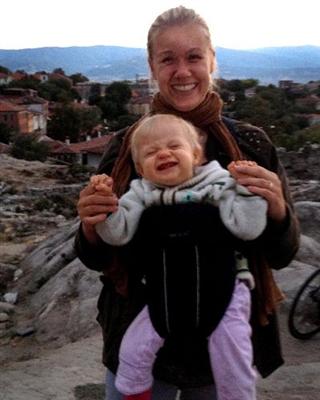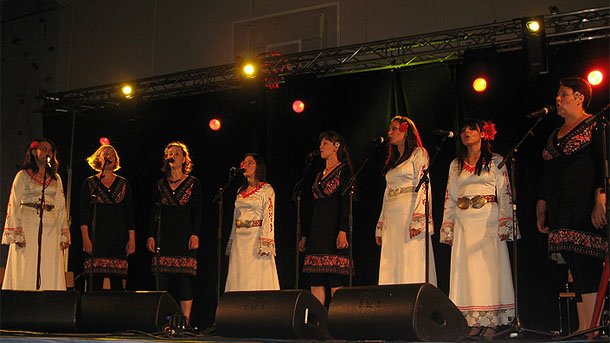Emmi Kujanpaa teaches music and conducts folk music groups, also performs folk songs from several different countries in the world. A month ago, the blond Finnish girl and her husband were in Bulgaria, visiting concerts, festivals and taking themselves part in singing and instrumental contests in music clubs in their favorite Bulgarian city, Plovdiv. They also brought to Bulgaria their young daughter, Leona, to introduce her to their numerous friends here.

Radio Bulgaria’s Albena Bezovksa met and talked to them in a special interview where Emmi presented herself in Bulgarian:
“I am here for the fifth time. In 2007, I took part in a folk seminar that was held at the Academy for Music and Dance in Plovdiv. I went there again in 2009 with a scholarship under Erasmus program and specialized in folk singing and also ethnomusicology, folk dances and tambourine. I am very happy that I had the chance to study with such brilliant professors who are well-versed in the intricacies of Bulgarian folk music.”
Emmi Kujanpaa graduated the Sibelius music academy at the University of Arts in Helsinki. Since the age of 6, she played the Kantele – a traditional folk instrument in Finland. She even participated in a folk group along with her grandfather who played the accordion, the mandolin, and used to sing folk songs. Her first encounter with Bulgarian folklore was in her university years.
“For the first time I heard Bulgarian folk music in Finland”, Emmi recalls. “I borrowed several CDs from the library. I was really excited and the songs from Balgarka trio simply made me cry. I decided that I had to learn what was inside in them, what was this think that made me empathize with various emotional states without understanding a single word from the language. I wanted to learn Bulgarian, to understand the lyrics of the songs. I wanted also to perform them myself.”
Several years later, Emmi was able to make this dream of hers come true. The young singer now knows well the various folklore genres of Bulgarian traditional music. Closest to her heart are Rhodopean songs – due to their characteristic glissando, the old-time pentatonic scale and the poignant lyrics. When she was at her training in Bulgaria, she decided to set up an octet and include there singers from Bulgaria and Finland.

“I have a Finnish-Bulgarian group. We are four girls in it from Helsinki and four from Plovidv. For the first time we sang together in 2010. I was a student in Plovdiv and at the same time a festival was prepared at the Sibelius Academy. The topic was the East. I decided that it would be interesting to make a program of Bulgarian and Finnish folk songs as well as of author’s improvisations and compositions. We managed to invite four Bulgarian singers – Marina Stefanova, Gergana Taskova, Iliana Tabor and Sonya Georgieva. At the festival also came Prof. Dora Stefanova – conductor of the Mystery of Bulgarian Voices Choir. Afterwards we started giving concerts in both countries”.
In august this year, Finno-Bulgarian Voices made recordings in Helsinki. Their CD is to be released in May 2014. In the album one can hear a famous song from the Shoppe region, My Uncle’s horses, interwoven with Finnish lyrics. The Bulgarian girls sing in Finnish, the Finnish girls - in Bulgarians. It is mixed with a tune from the northern Karelia region. The most characteristic thing in it is the manner of singing “yoik” – something similar to the “tresene” (rapid vocal tremolo on held notes) typical for Shoppe songs. It turns out that in Finland there are some ten groups performing Bulgarian folklore:
“I think that the interest towards Bulgarian music in Finland is due to the interesting rhythms and melodic specifics. What is more, in Finnish music there are very tangible influences from Slavic cultures. In the Russian republic Karelia that borders with Finland, music resembles in many features some Bulgarian tunes. That is why we are constantly trying to draw parallels. I teach in a musical institute in one of Helsinki’s suburbs. There we also have a vocal formation. It is called Kukuvitsa – the name is similar in Bulgarian also, and in some of the dialects in Karelia. We perform songs from both traditional cultures.”
The audio file contains performances of Finno-Balkan Voices
English version: Rossitsa Petcova